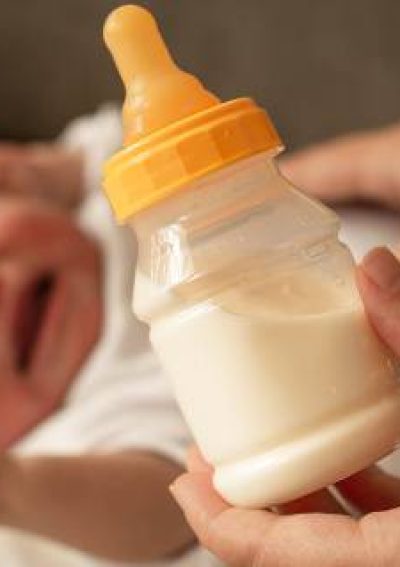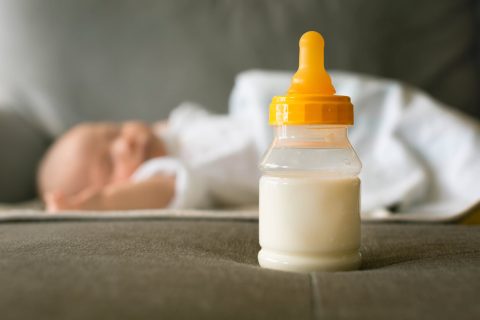NEC Baby Formula Lawsuit
NEC baby formula lawsuits continue to unfold, with 744 active cases. Bellwether trials are set for 2025, following recent verdicts totaling over half a billion dollars. Despite these, Abbott and Reckitt won a key Missouri case, successfully defending their formulas against NEC claims.

Latest NEC Baby Formula Lawsuit Updates
As of July 2025, there were 744 active baby formula necrotizing enterocolitis lawsuits pending in MDL 3026 before U.S. District Judge Rebecca Pallmeyer in the Northern District of Illinois.
The first test cases — called bellwether trials — will begin in 2025.
- August 11, 2025: K.B. v. Abbott Laboratories.
- November 3, 2025: Brown v. Abbott Laboratories.
- February 2, 2026: Inman v. Mead Johnson & Company, LLC, et al.
While there are still no approved settlements or jury verdicts in the Illinois MDL, a state court case in Illinois ended in a $60 million plaintiff’s verdict in March 2024. In July 2024, a Missouri jury awarded $495 million to NEC baby formula plaintiffs.
A Missouri jury ruled in late October 2024 in favor of Abbott Laboratories and Reckitt, rejecting claims that their cow’s milk-based baby formulas caused necrotizing enterocolitis (NEC) in premature infants. The five-week trial verdict marked the companies’ first win in a baby formula lawsuit.
Elizabeth Whitfield, who sought $6.2 billion, argued that her son Kaine developed NEC after using these formulas. Abbott and Reckitt defended their products as essential nutrition for vulnerable infants and stated that no scientific evidence links their formulas to NEC.
-
May 2025:
The case that was slated to be the first bellwether trial in the baby formula MDL has ended in summary judgment in favor of the defendants. Judge Pallmeyer determined that the case, which was just days away from going to trial, failed to demonstrate Abbott's alleged failure to warn of NEC risks.
In brighter news for plaintiffs, Judge Pallmeyer also denied motions from defendants to exclude the testimony of two experts key to plaintiffs' claims. Without that testimony, the baby formula MDL cases may not have been able to move forward. -
March 2025:
Abbott and Mead Johnson's October trial win has been wiped out. A judge determined that the case, which was the formula manufacturers' only win in the NEC litigation, was impacted by misconduct from the defense team. Abbott and Mead Johnson are appealing that decision.
-
February 2025:
With the first bellwether trial just a few months away, the defendants in the baby formula MDL have filed a motion for summary judgment. This could largely end the litigation in their favor if approved, but is unclear how likely that is. Baby formula cases that have already gone to trial in state court have produced two major wins for plaintiffs.
-
January 2025:
2025 is set up to be a key year for the ongoing baby formula NEC litigation. The first bellwether trial in the MDL is set for May 5, with additional trials following in August and November.
-
October 2024:
The parties in the MDL have agreed on a bellwether trial date proposal, with the first case set to go to trial on May 5, 2025. Judge Pallmeyer must approve the proposal, which has the four cases running through February 2026.
-
September 2024:
The trial order has been set for the four upcoming bellwether cases. Ericka Mar, Administratrix of the Estate of RaiLee Mar v. Abbott Laboratories, is set to go to trial first. Judge Pallmeyer has directed counsel to set firm trial dates for these cases.
-
July 2024:
A Missouri jury awarded $495 million to the family of an infant who suffered severe complications from NEC after ingesting Abbott's premature infant formula in the NICU. Lawyers are saying this verdict could still influence the course of all baby formula litigation moving forward. The award comprised $95 million in damages and $400 million in punitive damages. Abbott has said they disagree with the verdict and will try to overturn it. This was a state court case, and bellwether trials in the federal MDL cases should start in May 2025 if the defendants don't try to negotiate a settlement before then.
-
June 2024:
Judge Pallmeyer released a scheduling order, and the start date of the first bellwether test trial became clear. According to the order, the first bellwether test trial will be in May 2025. Even if this bellwether is the first in the MDL, an Illinois jury trial ended in a $60 million verdict for a mother who lost her child to NEC.
-
May 2024:
MDL Judge Pallmeyer ordered that plaintiffs provide specific evidence that an infant ingested a Mead Johnson product before naming the company as a defendant in the litigation. Evidence may include medical and feeding records from birth.
-
March 2024:
An Illinois jury ruled that Mead Johnson, a subsidiary of Reckitt Benckiser, must compensate the mother of a premature infant who died from an intestinal disease after being given the company's baby formula, Enfamil, with a verdict of $60 million.
-
February 2024:
Judge Rebecca Pallmeyer scheduled hearings that involved several plaintiffs on sealed/private motions for March 2024.
-
December 2023:
Four bellwether cases had been selected, but the trial start dates weren't confirmed. Lawyers expected the first trials to take place in 2024.
-
November 2023:
On Nov. 3, 2023, Justice Pallmeyer signed an order noting that Mead Johnson’s motions to dismiss were entered and continued for briefing. The plaintiffs’ responses must be filed on or before Jan. 6, 2024.
-
October 2023:
The judge signed an order outlining the definition of terms and procedures the plaintiffs and defendants agreed to for how to handle NEC pathology reports and expert analysis.
-
July 2023:
Judge Pallmeyer held a status conference.
-
April 2023:
Lawyers were negotiating how discovery should proceed.
-
March 2023:
Science Day was scheduled for May 3, 2023. Both sides present the science of NEC and its link to cow’s milk baby formula before the court.
-
August 2022:
The Judicial Panel for Multidistrict Litigation consolidated about 97 lawsuits over NEC claims in Illinois MDL 3026.
Judge Matthew Kennelly presides over a separate Abbott MDL, no. 3037. This MDL is also in Illinois and is related to bacterial contamination of Abbott’s baby formulas. It does not have anything to do with NEC claims.
Why are Parents Filing Similac and Enfamil Lawsuits?
NEC baby formula lawsuits were filed because infants developed necrotizing enterocolitis after consuming Similac or Enfamil cow’s milk baby formula. Necrotizing enterocolitis, or NEC, is a severe gastrointestinal disease that causes intestinal tissue death and could lead to serious health problems or death.
Studies have shown that premature babies fed cow’s milk baby formula have an increased risk of developing NEC. An NEC lawsuit for baby formula claims that formula makers Abbott and Mead Johnson knew about the risk but failed to warn the public and continued to sell dangerous products.
NIH-Funded Study on Donor Milk and NEC
A study funded by the National Institutes of Health and published in September 2024 in the Journal of the American Medical Association revealed some significant findings about feeding highly premature babies.
The research found that babies born very early — before 29 weeks or weighing less than 2.2 pounds — fed donated human milk were much less likely to develop NEC than those fed baby formula. Specifically, only 4.2% of the babies who received human milk developed NEC, while 9% of those who received formula did.
This study, which involved 483 infants, provides strong evidence that giving extremely premature babies donor human milk can help lower their risk of this harmful condition.
Ongoing Clinical Trials and Research Priorities
In September 2024, the NEC in Preterm Infants Working Group, a U.S. Health and Human Services Department group focused on premature infants’ health, released recommendations concerning NEC.
- More research should be done on how different feeding methods can influence the risk of NEC.
- It's essential to better understand the nutritional needs of premature infants to ensure they receive the best care.
- When possible, there should be increased efforts to help parents produce enough milk and learn effective breastfeeding techniques.
- Research is needed to understand how donor or parent milk is collected, processed, stored, and given to infants can affect their nutritional quality and digestive health.
- Efforts should be made to organize large-scale clinical studies to explore how different feeding practices relate to NEC risk.
The working group emphasized that NEC is a complex disease influenced by various factors, and pointed out that one baby dies every day from the condition. Their findings highlight the importance of improving milk production, enhancing the benefits found in human milk and ensuring that families have better access to donor milk when needed.
In April 2022, judges consolidated Similac and Enfamil lawsuits nationwide into multidistrict litigation in the Northern District of Illinois under MDL 3026.
These cases all claim that “cow’s milk-based infant formula products marketed under the Similac and Enfamil brand names have a higher propensity to cause necrotizing enterocolitis (NEC) in infants born prematurely than other, allegedly safer alternatives,” according to the case transfer order.
Who Qualifies to File an NEC Baby Formula Lawsuit?
Parents or caregivers of premature babies who developed NEC after consuming Similac or Enfamil cow’s milk baby formulas may qualify to file an NEC baby formula lawsuit.
Babies may have consumed Similac or Enfamil in the hospital, and parents may have taken formula from the hospital or bought formula after bringing their preemie home.
Lawyers encourage parents and caregivers to keep all medical records, receipts and formula packaging as evidence in their case. If you don’t know if your baby was fed Similac or Enfamil, your lawyer may be able to help get this information.
How Much Will Baby Formula Lawsuits Be Worth?
The exact worth of Enfamil and Similac baby formula lawsuits has yet to be determined, though lawyers speculate the value could be in the millions. In March 2024, a state court jury in Illinois awarded $60 million to a mother who lost her child after the infant developed NEC following feeding with Enfamil.
It’s important to note that parents and caregivers are not guaranteed a specific amount of compensation. The severity of injuries, the cost of financial or physical damages and other losses may influence the value of a baby formula case.
After the first bellwether cases in 2025, lawyers will better understand the potential value of baby formula cases. Jury verdicts after bellwether trials could lead to global baby formula settlements.
Similac and Enfamil Baby Formula Recalls
Similac and Enfamil baby formulas have not been recalled for NEC. However, in February 2022, after some babies died from infections, Abbott issued a baby formula recall for potential bacterial contamination.
The recall included specific lots of EleCare, Similac and Alimentum baby formulas from Abbott’s factory in Sturgis, Michigan. The U.S. Food and Drug Administration found several strains of Cronobacter sakazakii at the plant during a March 2022 inspection, but it didn’t find any bacteria in product samples.
Cronobacter can cause serious illness in infants and may result in death. Symptoms of Cronobacter infection include jaundice, irritability, temperature changes, grunting breaths, poor feeding and excessive crying. Contact your child’s physician right away if you suspect infection.
Parents can see if their formula is included in the recall by entering lot numbers on Abbott’s recall website.
15 Cited Research Articles
Consumernotice.org adheres to the highest ethical standards for content production and references only credible sources of information, including government reports, interviews with experts, highly regarded nonprofit organizations, peer-reviewed journals, court records and academic organizations. You can learn more about our dedication to relevance, accuracy and transparency by reading our editorial policy.
- United States Judicial Panel on Multidistrict Litigation. (2025, July 1). MDL Statistics Report - Distribution of Pending MDL Dockets by Actions Pending. Retrieved from https://www.jpml.uscourts.gov/sites/jpml/files/Pending_MDL_Dockets_By_Actions_Pending-July-1-2025_0.pdf
- U.S. District Court for the Northern District of Illinois. (2025, May 2). Memorandum Opinion and Order. Retrieved from https://ecf.ilnd.uscourts.gov/doc1/067132422206
- Knauth, D. (2025, March 14). Abbott, Reckitt, Face New Trial Over Premature Infant Formula. Retrieved from https://www.reuters.com/business/healthcare-pharmaceuticals/reckitt-says-us-court-grants-new-trial-preterm-formula-case-2025-03-14/
- United States District Court for the Northern District of Illinois, Eastern Division. (2024, October 4). Stipulation Regarding Proposed Trial Dates. Retrieved from https://ecf.ilnd.uscourts.gov/doc1/067131234295
- United States Judicial Panel on Multidistrict Litigation. (2024, October 1). MDL Statistics Report - Distribution of Pending MDL Dockets by District. Retrieved from https://www.jpml.uscourts.gov/sites/jpml/files/Pending_MDL_Dockets_By_Actions_Pending-October-1-2024.pdf
- U.S. Department of Health and Human Services. (2024, September 16). Necrotizing Enterocolitis (NEC) in Preterm Infants Working Group of the National Advisory Council of Child Health and Human Development (NACHHD) Report to Secretary, Department of Health and Human Services. Retrieved from https://www.nichd.nih.gov/sites/default/files/inline-files/2024.09.16_NEC_WG_report_FINAL.pdf
- Pierson, B. & Knauth, D. (2024, July 26). Abbott must pay $495 million in premature infant formula trial, jury finds. Retrieved from https://www.reuters.com/business/healthcare-pharmaceuticals/abbott-must-pay-95-million-premature-infant-formula-trial-jury-finds-2024-07-26/
- National Institutes of Health. (2024, February 7). Science Update: Preterm Infants Fed Donor Milk Had Fewer Intestinal Complications Than Formula-Fed Infants. Retrieved from https://www.nichd.nih.gov/newsroom/news/020724-preterm-human-milk-study
- Colaizy, T.T. (2024, January 30). Neurodevelopmental Outcomes of Extremely Preterm Infants Fed Donor Milk or Preterm Infant Formula. Retrieved from https://jamanetwork.com/journals/jama/fullarticle/2814657
- Centers for Disease Control and Prevention. (2024). Cronobacter and Powdered Infant Formula Investigation. Retrieved from https://www.cdc.gov/cronobacter/outbreaks/source-date/index.html
- U.S. District Court of the Northern District of Illinois. (2023, November 3). Order to Dismiss. Retrieved from http://www.pacer.gov
- U.S. District Court of the Northern District of Illinois. (2023, October). Order Regarding Pathology. Retrieved from http://www.pacer.gov
- Abbott Laboratories. (2022, August 26). Abbott is Restarting Similac Production at Sturgis. Retrieved from https://www.abbott.com/corpnewsroom/nutrition-health-and-wellness/abbott-update-on-powder-formula-recall.html
- U.S. Food and Drug Administration. (2022, August 1). FDA Investigation of Cronobacter Infections: Powdered Infant Formula. Retrieved from https://www.fda.gov/food/outbreaks-foodborne-illness/fda-investigation-cronobacter-infections-powdered-infant-formula-february-2022
- Reuters. (2022, June 22). FDA Gets Complaint of One More Infant Death Related to Baby Formula. Retrieved from https://www.foxbusiness.com/politics/fda-complaint-one-more-infant-death-related-baby-formula
Calling this number connects you with a Consumer Notice, LLC representative. We will direct you to one of our trusted legal partners for a free case review.
Consumer Notice, LLC's trusted legal partners support the organization's mission to keep people safe from dangerous drugs and medical devices. For more information, visit our partners page.
844-763-0072

